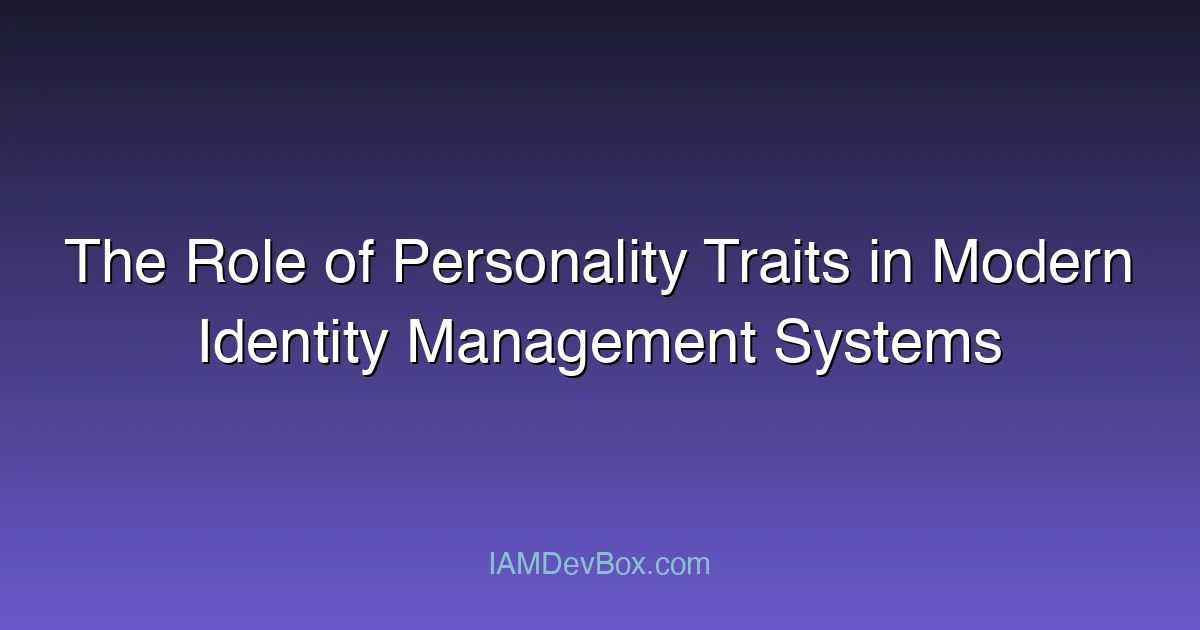Visual Overview:
graph TB
subgraph "Authentication Methods"
Auth[Authentication] --> Password[Password]
Auth --> MFA[Multi-Factor]
Auth --> Passwordless[Passwordless]
MFA --> TOTP[TOTP]
MFA --> SMS[SMS OTP]
MFA --> Push[Push Notification]
Passwordless --> FIDO2[FIDO2/WebAuthn]
Passwordless --> Biometric[Biometrics]
Passwordless --> Magic[Magic Link]
end
style Auth fill:#667eea,color:#fff
style MFA fill:#764ba2,color:#fff
style Passwordless fill:#4caf50,color:#fff
In the rapidly evolving landscape of identity management, understanding user behavior and psychology has become as critical as securing sensitive data. One intriguing approach to this challenge is leveraging personality traits, as measured by tools like the Eysenck Personality Questionnaire (EPQ), to enhance authentication and authorization processes. This blog explores how personality insights can be integrated into modern identity management systems to improve security, user experience, and decision-making.
Personality Traits and Digital Identity
The EPQ is a widely used psychological assessment tool that measures three primary personality dimensions:
- Extraversion (E): Sociability, assertiveness, and energy levels.
- Psychoticism (P): Prone to stress, impulsive behavior, and risk-taking.
- Neuroticism (N): Emotional stability, anxiety levels, and resilience to stress.
These traits can influence how users interact with digital systems, from password choices to behavioral biometrics. For instance, an extroverted user might prefer social login features, while a neurotic user might be more cautious about sharing personal data.
In the context of identity management, understanding these traits can help organizations tailor their security protocols to individual user behaviors. For example:
- High Extraversion: Users may benefit from simpler, more intuitive authentication methods, such as biometric login or single sign-on (SSO).
- High Psychoticism: Users might require additional layers of verification, such as step-up authentication, to mitigate risks associated with impulsive behavior.
- High Neuroticism: Users could be offered psychological support tools, such as stress-reducing interfaces, to improve their experience with security processes.
Implications for Identity Management Systems
Modern identity management systems (IDMs) rely heavily on behavioral analytics and machine learning to detect anomalies and prevent fraud. By incorporating personality insights, these systems can become more context-aware and adaptive.
1. Adaptive Authentication
Adaptive authentication adjusts security measures based on user behavior and context. For example:
- A neurotic user might exhibit consistent login patterns, making it easier to detect anomalies.
- A psychotic user might show irregular login times or locations, prompting additional verification steps.
Here’s a simplified code example of how adaptive authentication could work:
def adaptive_authentication(user_id, login_attempt):
user_profile = get_user_profile(user_id)
# Retrieve personality traits (E, P, N)
e_score = user_profile['extraversion']
p_score = user_profile['psychoticism']
n_score = user_profile['neuroticism']
if p_score > 80:
# High risk of impulsive behavior
if login_attempt['device'] != 'trusted':
trigger_step_up_auth(user_id)
elif n_score > 70:
# High stress sensitivity
if login_attempt['time'] > 10 PM:
offer_stress_reducing_interface(user_id)
else:
proceed_with_standard_auth(user_id)
This approach ensures that security measures are not one-size-fits-all but are tailored to individual user psychology.
2. Risk Assessment
Personality traits can also inform risk assessment models. For instance:
- Users with high psychoticism scores might be flagged for additional monitoring due to their tendency for risk-taking behavior.
- Users with high neuroticism scores might be considered low-risk but could require more empathetic error handling to prevent frustration.
A real-world application of this could be seen in financial institutions, where high-risk users (based on personality traits) are required to undergo extra verification steps before accessing sensitive accounts.
Case Study: Personality-Driven Identity Management
Consider a hypothetical e-commerce platform that integrates EPQ insights into its identity management system. The platform observes the following:
- Users with high extraversion scores tend to make quick purchasing decisions and prefer seamless login experiences.
- Users with high psychoticism scores often attempt to bypass security measures, such as multi-factor authentication (MFA).
- Users with high neuroticism scores are more likely to report issues with account security, such as forgotten passwords.
Based on these observations, the platform implements the following strategies:
- Extraverts: Offer single sign-on (SSO) and biometric authentication options to streamline their login experience.
- Psychotics: Enable MFA by default and monitor account activity for suspicious patterns.
- Neurotics: Provide proactive password reset options and stress-reducing interface elements, such as calming colors and clear instructions.
The result is a more personalized and secure user experience, with a significant reduction in account breaches and user complaints.
Challenges and Considerations
While integrating personality insights into identity management systems offers exciting possibilities, there are several challenges to address:
- Data Privacy: Collecting and using personality data raises ethical concerns. Organizations must ensure transparency and obtain explicit user consent.
- Accuracy: Personality assessments like the EPQ are not foolproof. Systems must account for potential inaccuracies and allow users to opt out.
- Bias: Over-reliance on personality traits could lead to biased security measures. For example, extroverted users might be unfairly flagged as low-risk.
To mitigate these challenges, organizations should adopt a balanced approach, combining personality insights with traditional security metrics like device fingerprinting and behavioral analytics.
The Future of Identity Management
The integration of psychology into identity management represents a paradigm shift in how organizations approach security. By understanding user behavior at a deeper level, organizations can create more adaptive, empathetic, and secure systems.
As we move forward, the following questions will be critical for the industry:
- How can we ensure that personality-driven security measures do not infringe on user privacy?
- What role will artificial intelligence play in analyzing and applying personality insights?
- Can personality traits be used to predict and prevent insider threats?
The answers to these questions will shape the future of identity management, making it not just about securing identities but also about understanding the people behind them.
About the Author: [Your Name] is a cybersecurity expert with a passion for exploring the intersection of psychology and technology. With over a decade of experience in identity management, [Your Name] has helped numerous organizations enhance their security frameworks while prioritizing user experience.
Related Reading:
- How Behavioral Biometrics Are Revolutionizing Authentication
- The Role of AI in Modern Identity Management
Join the Conversation: Have you considered integrating personality insights into your identity management system? Share your thoughts in the comments below!

